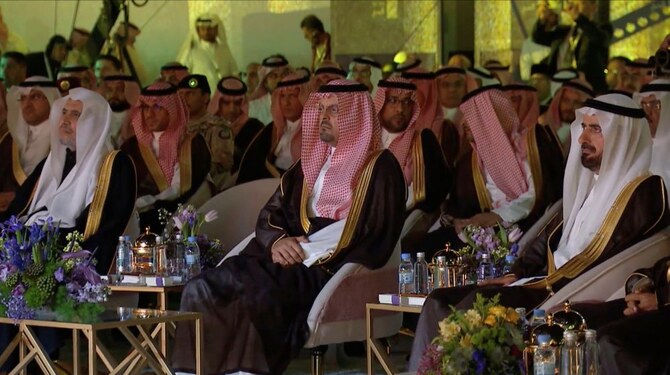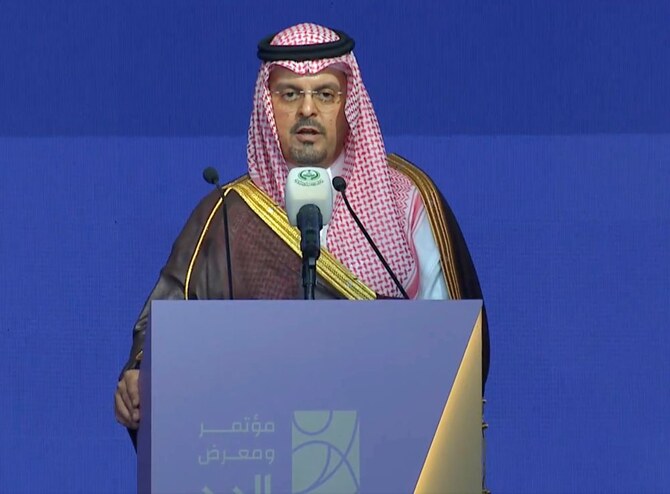JEDDAH: The fourth Hajj and Umrah Services Conference and Exhibition, hosted by the Ministry of Hajj and Umrah and the Pilgrim Experience Program, began on Monday in Jeddah.
Makkah Deputy Gov. Prince Saud bin Mishaal bin Abdulaziz inaugurated the event, which was attended by Minister of Hajj and Umrah Tawfiq Al-Rabiah, Islamic ministers, ambassadors and representatives from 87 countries.
Al-Rabiah announced that the total number of pilgrims and Umrah performers visiting Makkah and Madinah in 2024 reached a historic record of 18,535,689 individuals, including 16,924,689 Umrah performers and 1,611,310 Hajj pilgrims.
The four-day event, themed “The Road to the Nusuk,” features more than 300 local and international organizations showcasing innovations and technologies to enhance the Hajj and Umrah experience.
Key topics include logistics, transportation, crowd management, housing, hospitality and catering — pillars for improving rituals and pilgrim services, according to the Ministry of Hajj and Umrah.
The event includes 47 discussion sessions, 50 workshops, and more than 130 local and international speakers addressing sustainability, eco-friendly technologies, AI in crowd management and digital solutions, while highlighting opportunities for startups and innovators in the Hajj sector.
Saed Al-Jahni, chairman of the Coordination Council for Domestic Pilgrims Service Facilities, told Arab News that the event reflected Saudi Vision 2030’s goal to enhance the experience of the Guests of Allah and provide top-tier services.
He added: “All relevant parties gather to showcase Saudi Arabia’s Hajj efforts, attract thought leaders and innovators to exchange knowledge, anticipate future trends, share best practices, and foster partnerships, agreements and initiatives. The event also engages researchers, innovators and entrepreneurs to tackle challenges and improve services for the Guests of Allah.”
Mohammed Muajini, chairman of Ashraqat Hajj company, said that the aim was to showcase the company’s achievements and future initiatives to enhance Hajj and Umrah services through technology and artificial intelligence, in line with Vision 2030.
On the sidelines of the conference, Pakistan and Saudi Arabia have signed a agreement allowing 179,210 Pakistani pilgrims to perform Hajj this year, according to Pakistan’s Ministry of Religious Affairs.
The agreement was signed by Pakistan’s Religious Affairs Minister Chaudhry Salik Hussain and Al-Rabiah.
Saudi Arabia also signed a Hajj agreement with India, enabling 175,025 Indian pilgrims to perform the pilgrimage this year.
Indian Minister of Minority Affairs Kiren Rijiju finalized the deal with Al-Rabiah. “We are committed to providing the best possible services to all our Hajj pilgrims,” Rijiju wrote on X.
Indonesia will send 221,000 pilgrims under a similar agreement signed by Indonesian Religious Affairs Minister Nasaruddin Umar and the Saudi Hajj minister in Jeddah.
Meanwhile, in collaboration with the Ministry of Hajj and Umrah, Umm Al-Qura University is organizing the “Humanizing the Holy Sites” hackathon, inviting university students, entrepreneurs, engineers, designers and specialists to develop innovative and sustainable solutions that improve the pilgrim experience while reducing environmental impact.
A ministerial session will be held where key ministers and officials from government entities will discuss and present new and ongoing services, projects and initiatives designed to improve the pilgrim journey.


























